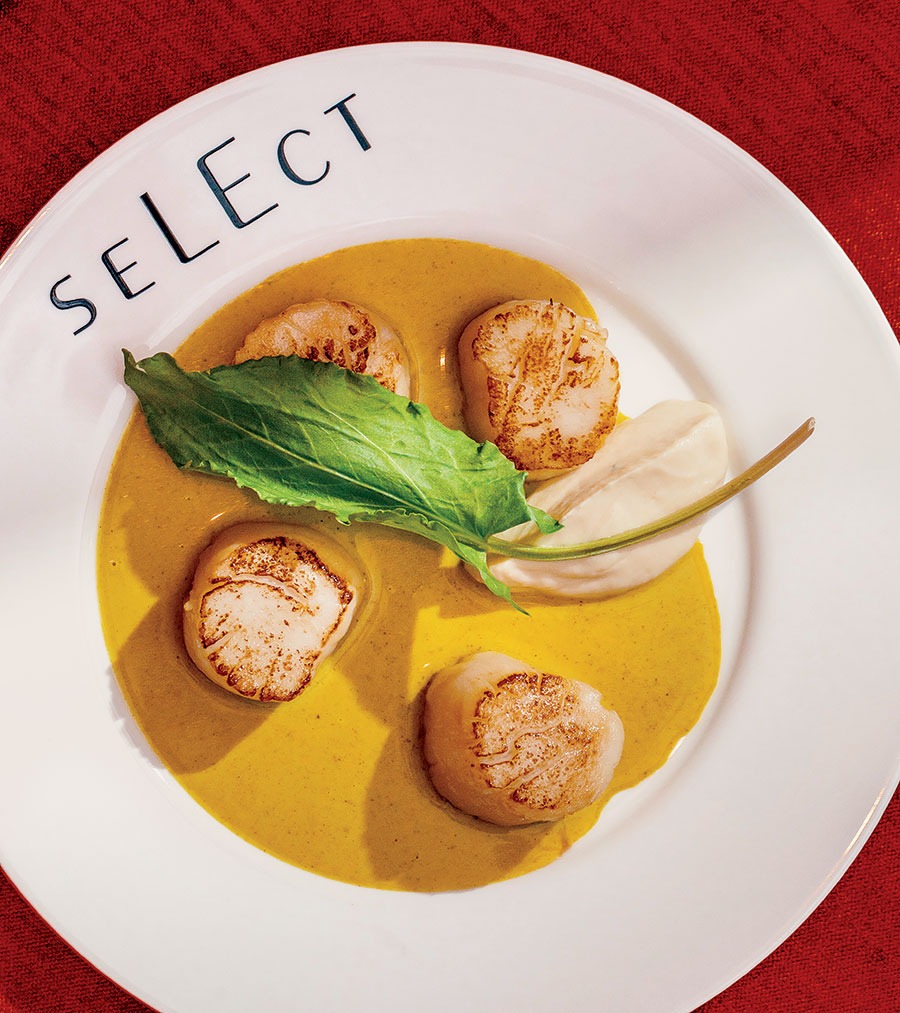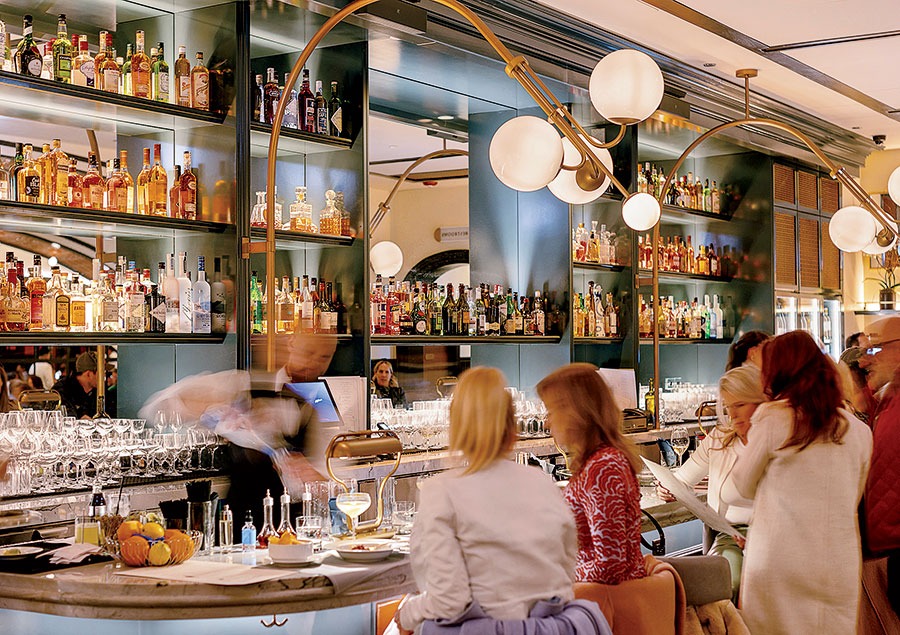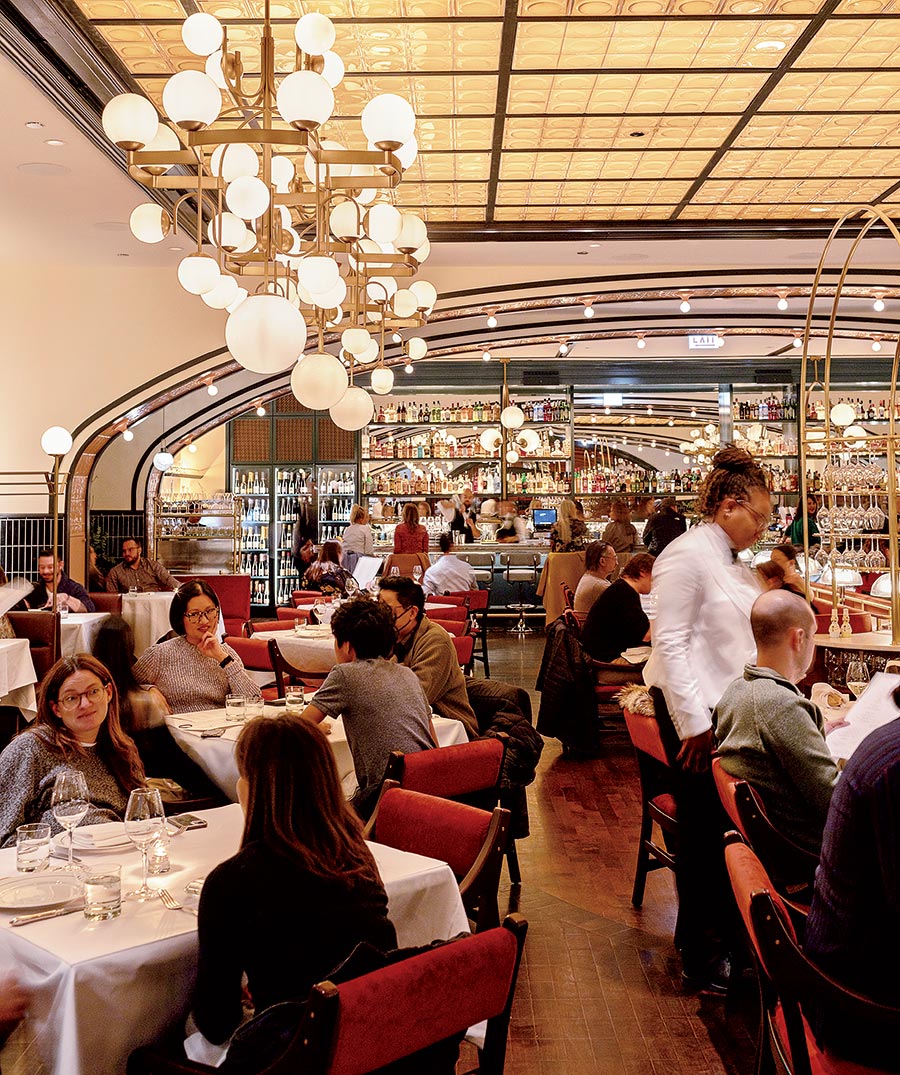Years ago we were on vacation in Paris when my wife was called home for a family emergency. I found myself alone with our three tween girls and no agenda. Over the next few days, we became regulars at the boisterous brasserie around the corner from our hotel. Good move. The adventurous child tried her first foie gras, the carnivorous one ate steak frites, and the picky one ordered baguette cheese sandwiches. I ran through the classics, from warm herring and potatoes to choucroute garnie.
Such are the pleasures of brasserie dining, where you can splurge, make do with a sandwich, or revisit an old fave. At a brasserie, there will be white tablecloths, porcelain plates, servers in long aprons lashing through the dining room with overburdened trays held aloft. A good brasserie promises to do it all correctly, and when it delivers, it earns your fealty.
Daniel Rose has long thought Chicago ripe for a big, ballsy brasserie. The 45-year-old Wilmette native has had a storied career trajectory, first making his name as a young, visionary American chef at Spring, a small but influential Paris bistro. From Spring, he sprang onto the American scene in 2016 with Le Coucou, a lavish but just shy of haute Manhattan restaurant financed by East Coast restaurateur Stephen Starr. That sensation won him a James Beard Award for best new restaurant as well as a legion of new fans. I have loved Le Coucou since it opened and would put both its pike quenelles and its leek vinaigrette with hazelnuts on my deathbed menu.
Even before Le Coucou, Rose has wanted to go big in his hometown. “This city’s richness comes from its commercial tradition, and a brasserie is the place where commerce and cuisine meet. The Adler Planetarium and Field Museum were built by commerçants,” he told me, using the French word for “trader” to drive home the thought. Working with Boka Restaurant Group, he has realized this vision with River North’s Le Select, the city’s biggest restaurant opening since the pandemic. It is a huge place, a gorgeous place, a place that smells like crisp, fresh money. It’s a place where the captains wear white stewards’ jackets and a chariot de hors d’oeuvres rolls through the dining room.
I’ve been to Le Select three times, and I’ve loved both its upfront bravura and its thoughtful, tradition-minded underpinnings. Still, this restaurant isn’t yet performing as well as it should. With his keen eye for detail, Rose can transport you to Paris and big-shouldered brasserie culture. But repeated gaffes from both the kitchen crew and the service staff burst the bubble, and suddenly you’re back at another downtown food factory that’s huge, uneven, and expensive. Is that half roast chicken really $46? Mais, oui.
Before we go there, let’s stop and drink this place in — these acres of patterned terrazzo, cinnabar velour, and antiqued mirroring, a place where belle époque and steampunk aesthetics meet in a kind of art deco streamlined swish. Also, the people-watching is nonpareil. On one visit I sat next to the cast from The Bear.

On that visit, we started with a round of kirs (the classic Champagne-cassis, as well as variations made with beer or lemon soda) and called that hors d’oeuvres trolley over. While the cart has since been removed from the menu (for now at least), it was a fun if diddly way to begin, with lots of little plates, along with bread and butter taken from a block so big you want to carve Princess Kay of the Milky Way’s likeness in it. We ate a little eggplant puff with our fingers, and dug into a mound of fantastic gravlax-topped céleri rémoulade with a fork. I wasn’t sure how to attack a bloopy half egg that someone in the kitchen had a hard time peeling. It came napped with fresh mayonnaise and a dollop of mushy caviar imported from a French purveyor. (There are better domestic sources; just sayin’.) I love the idea of an apéro and nibbles before dinner, but this $25-a-head spread made me miss the honest French café food it references.
When the menu moves into hearty snacks and appetizers, it starts to sing. Le Select’s croque monsieur is an exemplar of form with its sharp Alpine cheeses, bubbly glaze, and side of green salad. In a similar vein, the Alsatian tarte flambée brings a crackery crust topped with smoked bacon, crème fraîche, and sweetly melted onions. An oil-glossed slice of raw tuna ravigote comes slathered with so much deliciously creamy-pickley, tarragon-tinged sauce that you reach for the bread to mop up every bit and then …
The Edith Piaf record stops with a needle scratch. If you want bread with your meal, you’ve got to pay $12 for an entire épi from La Fournette (serviceable) and a dish of Norman butter (great). This is a brasserie with paper covering the white linen and no bread plates, because convivial brasserie dining means you expect endless crusty bread and keep it right on the table next to your plate for sopping purposes. Free bread is a human right in France, like retirement at 62. Charging for bread? That’s some Marie Antoinette shit.
You’ll pay a high price for entrées, which arrive on shiny porcelain plates imprinted with the restaurant’s logo. The undisputed star is fat sea scallops quivering in a magical state between raw and cooked and set over a thick, creamy curry. Yet that expensive chicken is more of a bore than its Armagnac, prune, and bacon set would suggest. I’ve tried the (cough, $58) steak au poivre twice. Ordered medium-rare, it came out a very wiggly rare once and barely pink the other time.
Alas, these issues have a way of piling up. The pommes allumettes are some soggy-ass french fries. A duck breast has a rubbery texture and soft, fatty skin. A dry, underseasoned meat pie called tourte alsacienne comes out barely warmed, like something you’d enjoy from the pastry case at Brioche Dorée but not as a plated appetizer. An intriguing jellied terrine of skate and crab comes with two lobes of uni that are spoiled one time but great the next.

Service has been chaotic enough on weekday nights that I’d hesitate to go on a Saturday. Captains upsell you on side dishes and then forget to bring them. Bussers ignore empty water glasses. The wine list offers some nice choices for those of us who aren’t going triple digits, but wine service is odd and poorly timed. The sommelier described our Chiroubles as “spicy and flirtatious,” and when we asked him to expound a bit, he repeated, “IT’S SPICY AND FLIRTATIOUS,” like we just couldn’t hear him the first time.
Skip the bigger-ticket items to go all in on dessert, which is Le Select’s sweetest spot. A syrup-soaked savarin au rhum comes with a cloud of whipped cream and a splash of tableside spirits. The rich, ridiculously good crème caramel is prepared with a recipe developed by Rose’s wife, Marie-Aude, also a chef. The profiteroles — crisp choux pastries filled with vanilla ice cream and doused with hot bitter chocolate sauce tableside — bring me back to that brasserie in Paris.
In conversation with Rose, I begin to understand he’s trying something different here from what he’s done in the past. In Paris and New York, he has used his outsider’s perspective to gently update the classics of French restauration for a new generation. At Le Select, he’s taking his insights into the culture and tropes of this style of dining and bringing it home. I ask him if he’s happy with how his kitchen staff of 40 is performing. He wriggles away from the question, praising the quality of cooks in Chicago, but admitting that his initial chef de cuisine didn’t work out and has been replaced with Pat Sheerin, late of Trencherman.
I hope this new hire will help Le Select reach its potential, but it has a ways to go to earn my loyalty. Though Rose lives in Paris, he intends to spend the next months here getting it into shape, maybe even earning its stripes as a Chicago classic. This place is important to him as a Chicagoan, he says, and “we intend to be here for a long time.”




